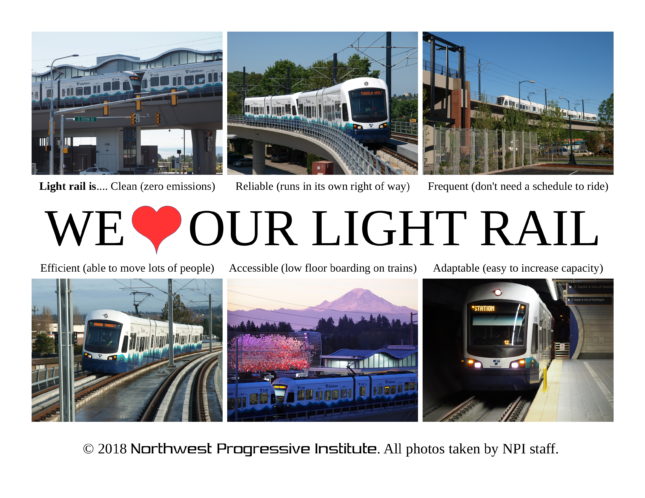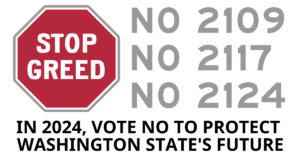It’s hard to think of a politician who more powerfully epitomizes the word shameless than Tim Eyman, especially when it comes to matters of dollars and cents.
The fifty-two year old has been a full time politician for almost twenty years and is so obsessed with profiting from politics that he has orchestrated illegal schemes to steer more of his donors’ money into his own pockets without their knowledge.
But while Eyman loves helping himself to his donors’ money, he doesn’t think our elected representatives’ pay should be increased, declaring this week that he wants to subject the salary increases proposed by the Washington Citizens’ Commission on Salaries for Elected Officials to a statewide referendum and overturned.
Eyman’s mantra is “Give Them Nothing”, which implies our elected representatives shouldn’t be paid anything at all, let alone the increases the Commission has proposed.
“At NPI, we’ve lost track of how many times we’ve heard Republican candidates and right wingers like Eyman insist that government should be run like a business,” said Northwest Progressive Institute founder and Executive Director Andrew Villeneuve, who has been organizing opposition to destructive Eyman schemes for nearly seventeen years.
“It sure is a frequent refrain in their discourse. In the private sector, though, compensation is considered very important to the recruitment and retention of high caliber candidates for executive positions. If right wing Republicans like Eyman really want government run like a business, shouldn’t they be willing to pay top dollar to attract the very best people to serve in our Legislature, judiciary, and executive department? How do you get competent government if your mantra is ‘Give Them Nothing’?”
Eyman has some nerve railing against pay increases for politicians considering his own long-running obsession with profiting from politics.
Seventeen years ago, Eyman famously professed to be working on initiative campaigns for free, when he was in reality transferring large sums of money out of his campaign committees to pay himself, and then lying about it.
Northwest Passage Consulting principal Christian Sinderman and others suspected what Eyman was up to, and in early 2002, the Seattle Post-Intelligencer published an investigate report about Eyman’s suspicious money transfers. Eyman continued to deny what he’d done until his guilty conscience caught up with him. He called up The Associated Press’ David Ammons and confessed, saying “it was the biggest lie of my life”.
“The fact is, it is true that I made money in past campaigns and planned to make money on future campaigns,” Eyman told Ammons in a rambling confession. “This entire charade was set up so I could maintain a moral superiority over our opposition, so I could say our opponents make money from politics and I don’t.”
“I want to continue to advocate issues and I want to make a lot of money doing it,” Eyman added. Seventeen years later, it’s quite apparent that this particular statement is one of the few Eyman has made that can be called entirely truthful.
After he was caught lying in 2002, Eyman began openly paying himself a salary out of campaign funds and also raising money for what he called his “compensation fund”.
But that was not enough.
The ever-greedy Eyman concocted a scheme with one of his vendors to receive kickbacks from them that were not reported to the Public Disclosure Commission. Attorney General Bob Ferguson’s office is trying to get to the bottom of this concealment scheme, but has been stymied by Eyman’s refusal to cooperate. Eyman remains in contempt of court and on the hook for $500 daily fines for refusing to turn over records in the case.
The Washington Citizens’ Commission on Salaries for Elected Officials has a constitutional obligation to examine the salaries of our elected officials and propose adjustments to those salaries. Created by a vote of the people in 1986, it is one of the few commissions of its kind. Its salary changes can be overturned by referendum as provided for in Article XXVIII of the Washington State Constitution, but the pay increases the Commission has proposed for 2019-2020 are entirely reasonable.
“I have yet to hear Cougar alum Tim Eyman complain about how much Washington State University is paying Mike Leach to coach their football team,” said Villeneuve, who noted that Leach and UW head football coach Chris Petersen make far more than anyone serving the people of Washington in the statehouse.
Leach is set to make $3.5 million alone this season… more than the Governor, Lieutenant Governor, Attorney General, State Auditor, State Treasurer, Secretary of State, Commissioner of Public Lands, Insurance Commissioner, and Superintendent of Public Instruction combined. Petersen is making even more than Leach; he took home $4.125 million last season. The Huskies and Cougars each have many additional coaches who make more than what anyone serving in the statehouse makes.
Villeneuve noted that while statewide elected officials’ pay is enough to support a family on, Washington’s legislators are not well compensated for the jobs that they do.
“Most of our lawmakers currently receive a salary of $48,731,” Villeneuve pointed out. (Certain lawmakers receive higher salaries due to holding leadership positions.) This is below the 2014 median income of a Washington State household, which is $61,366.
“We, the people of Washington, are paying our lawmakers a part time salary while expecting them to do full-time work,” Villeneuve said.
“The Legislature may not be in session year-round, but being a well-informed lawmaker is nevertheless a full-time job. There is no ‘off season’ for lawmakers. When one session ends, the preparation for the next session begins. Lawmakers meet with constituents, conduct research, attend committee days, participate in work sessions, and go on fact finding trips during the months they aren’t in session.”
“These salary increases are overdue and entirely justified,” said Villeneuve. “For 2019, the Commission is proposing a base increase in legislator pay to $53,024, to be followed by another increase in 2020 to $57,425. These are good first steps, but we should be increasing legislator pay to an even greater extent to encourage more Washingtonians to consider running for office. Right now, legislative service simply isn’t a realistic option for many people because it doesn’t pay enough to raise a family on.”
“I believe we would get a Legislature that looks more like our diverse state if we provided a more appropriate level of compensation for our legislators. If red state Alaska can afford to pay their legislators a higher salary — and they do — then we certainly can, too.”
In the event Eyman or anyone else is serious about mounting a referendum campaign to overturn the Commission’s salary adjustments, which are entirely reasonable, NPI will work with other organizations to develop a campaign to educate the public about the need for appropriately-compensated elected officials.
FURTHER READING: How Much Should State Legislators Get Paid? by Amelia Thomson-DeVeaux for FiveThirtyEight

 Eyman claims to have collected 202,172 signatures for I-976 so far, which for all we know could be a made up number. He needs 350,000 by January 4th, 2019.
Eyman claims to have collected 202,172 signatures for I-976 so far, which for all we know could be a made up number. He needs 350,000 by January 4th, 2019.
